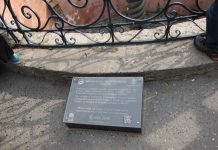Now, the harmonious structure and great charm of the Caesar’s writings are well-known to all who have chanced to take a look at his books. However, as I have already mentioned, when he had got as far as my father’s reign, and sketched out a draft of it, and brought it back to us half-finished from abroad, he also, alas! brought back with him a fatal disease. This was induced, maybe, by the endless discomfort of a soldier’s life, or by his over-many expeditions, or again, from his overwhelming anxiety about us, for worrying was innate in him, and his troubles were incessant. In addition to these causes, the varieties and severities of climate experienced, all contributed to mix the fatal draught for him.
For he started hence on an expedition against the Syrians and Cilicians when seriously out of health; from Syria he went on ill to the Cilicians, from them to the Pamphylians, from the Pamphylians to the Lydians, and Lydia sent him on to Bithynia, who finally returned him to us and to the Queen of cities suffering from an internal tumour caused by his incessant sufferings. Yet, ill as he was, he was anxious to tell the tragic story of his adventures, but was unable to do so, partly because of his disease, and partly because we forbade it through fear that the effort of talking might cause the tumour to burst.
IV Having written so far, dizziness overwhelms my soul, and tears blind my eyes. Oh! what a counsellor the Roman Empire has lost! Oh, for his accurate understanding of affairs, all of which he had gained from experience! And his knowledge of literature, and his varied acquaintance with both native and foreign learning! Think, too, of the grace of his figure and beauty of face, which would have befitted not only a king, as the saying goes, but even a more powerful, nay, a divine person!
To turn to myself—I have been conversant with dangers ever since my birth “in the purple,” so to say; and fortune has certainly not been kind to me, unless you were to count it a smile of kind fortune to have given me “emperors” as parents, and allowing me to be born “in the purple room,” for all the rest of my life has been one long series of storms and revolutions. Orpheus, indeed, could move stones, trees, and all inanimate nature, by his singing; Timotheus, too, the flute-player, by piping an “orthian” tune to Alexander, incited the Macedonian thereby to snatch up his arms and sword; lout the tale of my woes would not cause a movement in place, nor rouse men to arms and war, but they would move the hearer to tears, and compel sympathy from animate, and even inanimate, nature.
Atlantic Ocean
Verily, my grief for my Caesar and his unexpected death have touched my inmost soul, and the wound has pierced to the profoundest depths of my being. All previous misfortunes compared with this insatiable calamity I count literally as a single small drop compared with this Atlantic Ocean, this turbulent Adriatic Sea of trouble: they were, methinks, but preludes to this, mere smoke and heat to forewarn me of this fiery furnace and indescribable blaze; the small daily sparks foretold this terrible conflagration. Oh! thou fire which, though unfed, dost reduce my heart to ashes!
Thou burnest and art ever kept alight in secret, yet dost not consume. Though thou scorchest my heart thou givest me the outward semblance of being unburnt, though thy fingers of fire have gripped me even to the marrow of my bones, and to the dividing of my soul! However, I see that I have let my feelings carry me away from my subject, but the mention of my Caesar and my grief for him have instilled devastating sorrow into me.
Now I will wipe away my tears and recover myself from my sorrow and continue my task, and thus in the words of the tragedian; “I shall have double cause for tears, as a woman who in misfortune remembers former misfortune.” [Euripides, Hecuba 518] To have as my object the publication of the life of so great and virtuous a King will be a reminder of his wondrous achievements, and these force me to shed warm tears, and the whole world will weep with me. For to recall him, and make his reign known, will be a subject of lamentation to me, but will also serve to remind others of the loss they have sustained.
Now I must begin my father’s history at some definite point, and the best point will be that from which my narrative can be absolutely clear and based on fact.
Read More about Caesar Nicephorus








